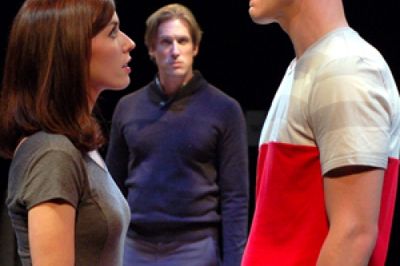Recently, the culture has seen the rise of what are known as “mostly straight” guys. You know, the ones who are straight, but who sometimes quietly make exceptions. It’s not quite the same thing as being bisexual. This is not a new type of sexuality -- these guys have always been around, just largely hidden. But they are starting to become more visible. Of course, these guys have their counterparts, the “mostly gay” guys who love men … except when they don’t. These situations are more controversial and even more secretive than their straight counterparts.
The Unicorn Theatre has once again proved that it has its thumb on the pulse of contemporary culture by bringing the “mostly gay” subject into the light. Cock, which runs through May 17, is a savagely funny British play about a gay man named John. He is in an unhealthy relationship and decides to take a break from his boyfriend. Then he meets a woman and falls in love with her. Confused and indecisive, he drags his boyfriend and girlfriend into a mess of ego and emotion.
The play is played out like a boxing match (or more accurately, a cock fight). The set consists only of a ring around a spot of floor. New scenes are announced by a bell signaling a new round. The play takes place inside the ring, as the various characters interact with each other, verbally dodging and weaving, and giving nasty punches when they can.
In a challenging twist to conventional theater, not only are there no props, there is no miming, either. Nobody pretends to eat, even while they’re eating. Nobody actually kisses, even when the characters do. In fact, nobody ever even makes physical contact with anybody else. This is a clever way to force the audience to focus totally on the conversations and not be distracted by what anybody is doing.
In a slowly amazing transformation, the play ends up becoming something else than what it was when it began. It starts as an unconventional romantic triangle, revolving around a man who is frustratingly confused about what he wants. But as the characters continue to chip away at each other, it becomes more about the man and woman fighting over John -- their own egos and insecurities make the situation worse than it needs to be. By the end of the show, it gets excruciatingly awkward, until you realize that we are no longer watching specific characters, but the large-scale conflict between different psychological and cultural perspectives on life.
Director Jeff Church, who is perhaps best known for his family-oriented plays at the Coterie Theatre, shows once again that he can handle the Big Adult Questions. He deftly guides the characters through what could easily have become a confusing morass of immature insults and blush-inducing sex jokes.
The small cast works very well together. Jacob Aaron Cullum throws it all out there as John, using his body and face to communicate some very complicated emotions – and he makes it work. Zachary Andrews is great as the bitchy boyfriend who uses whatever advantage he has to try to put his old life back together. And Molly Denninghoff is super cool as the feisty woman who knows what she wants and is willing to go get it. In an unfortunately small role, Matthew Rapport accurately reflects a certain type of attitude that is becoming increasingly untenable in modern society. (Read Paul Donovan’s interview with Church, Andrews and Cullum at '
